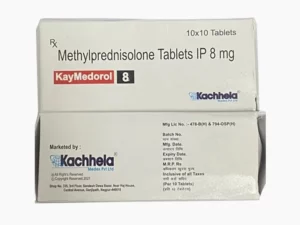“Comprehensive Guide to Kaymedorol 4 mg (Methylprednisolone): Uses, Dosage, Side Effects, and Precautions”
🩺 What is Kaymedorol 4 mg?
Kaymedorol is a brand name for methylprednisolone, a synthetic corticosteroid used to treat various inflammatory and autoimmune conditions. The 4 mg oral tablet is commonly prescribed for managing acute flare-ups or as part of a tapering regimen in chronic conditions.
🧪 Mechanism of Action
Methylprednisolone works by suppressing the immune system and reducing inflammation. It inhibits the release of substances that cause inflammation, providing relief in conditions like allergies, arthritis, and skin disorders.
💊 Indications
Kaymedorol 4 mg is prescribed for:
- Allergic reactions
- Asthma and other respiratory disorders
- Autoimmune diseases (e.g., lupus, rheumatoid arthritis)
- Skin conditions (e.g., eczema, psoriasis)
- Inflammatory bowel diseases (e.g., Crohn’s disease, ulcerative colitis)
- Certain cancers (as part of chemotherapy regimens)
- Eye conditions (e.g., uveitis)
💊 Dosage and Administration
- Typical oral doses range from 2 mg to 60 mg daily, depending on the condition being treated.
- Administration: Take with food and a full glass of water to minimize stomach irritation.
- Missed dose: If you miss a dose, take it as soon as you remember unless it’s almost time for your next dose. Do not double doses.
- Overdose: Seek immediate medical attention if an overdose is suspected.
⚠️ Warnings and Precaution
Before taking methylprednisolone, inform your healthcare provider if you have:
- Allergies to methylprednisolone or other corticosteroids
- Infections (e.g., tuberculosis, fungal infections)
- Heart disease, high blood pressure, kidney or liver disease
- Diabetes or thyroid disorders
- Mental health issues, osteoporosis, or eye conditions like glaucoma
- Recent vaccinations or planned immunizations
Avoid live vaccines during treatment. Corticosteroids can suppress the immune system, increasing the risk of infections.
💥 Potential Side Effect
Common side effects may include:
- Increased appetite and weight gain
- Mood swings, anxiety, or depression
- Insomnia
- Fluid retention and swelling
- Elevated blood sugar levels
- Digestive issues like nausea or stomach discomfort
Serious side effects require immediate medical attention:
- Severe allergic reactions (e.g., rash, itching, swelling)
- Vision problems, eye pain, or redness
- Signs of infection (e.g., fever, chills)
- Unusual tiredness or weakness
- Stomach pain, vomiting blood, or black stools
- Mental/mood changes (e.g., hallucinations, aggression)
🔄 Drug Interactions
Methylprednisolone may interact with:
- Blood thinners (e.g., warfarin)
- Antibiotics (e.g., erythromycin, clarithromycin)
- Antifungals (e.g., ketoconazole)
- Anticonvulsants (e.g., carbamazepine, phenytoin)
- Diuretics and other medications affecting electrolyte balance
- Vaccines (live vaccines should be avoided)
Always inform your healthcare provider of all medications and supplements you are taking.
🍼 Use During Pregnancy and Breastfeeding
Methylprednisolone should be used during pregnancy only if clearly needed. It is unknown if it passes into breast milk; consult your doctor before breastfeeding.
🧾 Storage
Store at room temperature (20–25°C or 68–77°F), away from moisture and heat. Keep out of reach of children.








Reviews
There are no reviews yet.